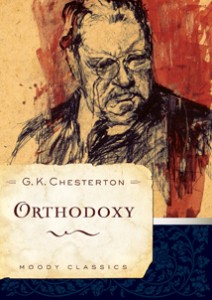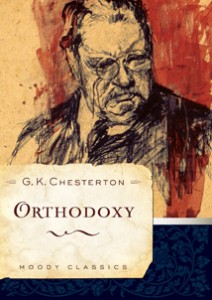In the first post of this series, Matthew Lee Anderson and I described the merits of G.K. Chesterton and his book Orthodoxy. We also invited you to read along and discuss the latest section of the reading plan with us each week.
Previously, we focused on the introduction, "In Defense of Everything Else," as well as chapters 2 and 3, "The Maniac" and "The Suicide of Thought." The week before last, we went through chapters 4 and 5, "The Ethics of Elfland" and "The Flag of the World." Last week we dealt with chapter 6, "The Paradoxes of Christianity."
Today, we are discussing chapters 7-8 "The Eternal Revolution" and "The Romance of Orthodoxy."
Trevin: Why "progress" and "open-mindedness" often mean the opposite
Chesterton's comments on progress are especially relevant today. He tackles the idea of "progress" by measuring it by a fixed ideal, as you said, not by changing the ideal again and again (which is what tends to happen in the world). The curious problem of progressive Christianity is that it tends to progress itself out of existence. It is parasitical on true Christianity, gaining converts by attracting disillusioned Christians who've grown tired of the ideal and offering them a new one. As Chesterton writes:
"It does not matter how often humanity fails to imitate its ideal; for then all its old failures are fruitful. But it does frightfully matter how often humanity changes its ideal; for then all its old failures are fruitless."
One other aspect of these two chapters deserves comment: Chesterton's inversion of what open-mindedness means in relation to orthodoxy. Chesterton points out the silliness of saying that it is more liberal to disbelieve in miracles than to believe in them. "For some inconceivable cause a 'broad' or 'liberal' clergyman always means a man who wishes at least to diminish the number of miracles; it never means a man who wishes to increase that number." I love his exposing of the closed-mindedness of naturalism: The man of the nineteenth century did not disbelieve in the resurrection because his liberal Christianity allowed him to doubt it. He disbelieved in it because his very strict materialism did not allow him to believe it.
Matthew: We want liberty, not libertinism
How Religion Poisons Everything is the subtitle of Christopher Hitchens' screed God is Not Great. Chesterton sets out to advance that Christianity actually makes things better. Or rather, the more precise argument is that by providing a picturesque fixed ideal, orthodoxy makes progress possible. Which if you think about it, is about as fun an inversion as you're going to find anywhere. Even these days, we have been told that the way forward for the church lies through a path where "everything must change," that progress means leaving behind orthodoxy for more comfortable confines. But the form of orthodoxy makes reformation possible, if Chesterton's argument has legs. As you said, It's a fixed ideal that we need to measure our "progress," which is what orthodoxy gives us.
It's interesting to me on this reading, though, how much Chesterton is focused on demonstrating Christianity's democratic element.
Login to read more
Sign in or create a free account to access Subscriber-only content.
Topics:
